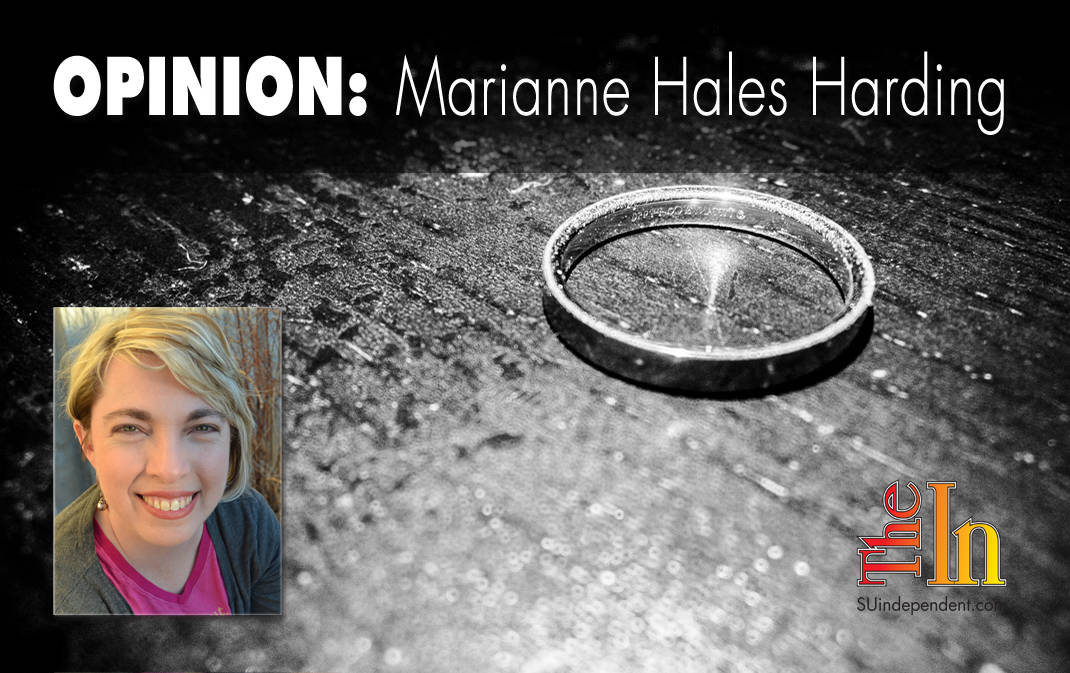
I can’t think of a time when I have walked out of an LDS Sacrament Meeting. I have thanked my lucky stars for a well-timed bathroom request from my children. I have rewritten many a boring or offensive talk in my head (thank you, Elder Eyring’s dad for that sage advice). I have sought refuge in the smiles of nearby babies or discarded coloring books. But I haven’t ever just plain walked out. I wanted to this week but was prevented by the logistics of being the organist (the talk in question was the last talk of the meeting — perilously close to the closing hymn).

Being a divorced person in a marriage-centric church means you have to develop a thick skin. There will be off-handed comments that push your buttons. There will be painful assumptions. There will be whole lessons that do not appear to directly apply to you. And I know divorced people aren’t the only people for whom this is true. The church is a group of imperfect people striving for perfection in an imperfect world (notice that’s two real-life imperfects to one hypothetical perfect). Sometimes, though, it just goes a bit too far.
This Sunday, we had a visiting High Councilor speaking on the stake-assigned topic of marriage. That, in itself, is unremarkable. Mormons talk about marriage a lot. But having it be the sole topic of the main worship meeting (which is much harder to escape than, say, the Marriage & Family Relations class in Sunday School) where a segment of the congregation was not only unmarried but painfully unmarried seemed about as good an idea as a Father’s Day slide show at an orphanage.
 It’s not that the concepts presented were irrelevant to my life. I interact with other humans all the time. I even live with a few. Ideas like prioritizing time to develop relationships with people you love are things that would clearly enrich my family. There was a boilerplate comment at the beginning of one talk to that effect — I know you’re not all married, but the principles have more broad application. Which is why, of course, the remainder of the talk focused entirely on the narrow application of these broad principles in a marriage setting. Because we single people are clever enough to generalize.
It’s not that the concepts presented were irrelevant to my life. I interact with other humans all the time. I even live with a few. Ideas like prioritizing time to develop relationships with people you love are things that would clearly enrich my family. There was a boilerplate comment at the beginning of one talk to that effect — I know you’re not all married, but the principles have more broad application. Which is why, of course, the remainder of the talk focused entirely on the narrow application of these broad principles in a marriage setting. Because we single people are clever enough to generalize.
I was talking with my sister’s family recently, and the discussion involved a female example of a general principle. My brother-in-law objected on the grounds that this wasn’t an all-female group having the discussion. I’m afraid I kind of lost it. I have spent my entire life in a male-centric world, generalizing from male examples. Maybe, just for once, men could sit down and generalize from me. That’s part of what was beyond the pale with this talk. I am so tired of generalizing from traditional-family/traditional-marriage examples. Maybe, just this once, Molly Mormon and Peter Priesthood could listen to a story about a single mom and dig out the nugget that applies to them, too. The boilerplate comment at the front of the talk didn’t make me feel like the speaker was truly inclusive and thoughtful. It just highlighted the fact that the bulk of the talk wasn’t. This is not to say that talk of marriage or examples from traditional family situations should not be used, but if the principles are truly applicable more broadly, why not make the entire talk more broadly inclusive?
This brings us to the next issue: Even within the narrow scope of marriage, the talks were still more exclusive than inclusive. The tone was quite patronizing towards women, setting up a world where women were, as one sister in the ward put it, “hot house flowers” and not equal participants in marriage (or, I imagine, life). It was not patriarchy’s finest hour. In fact, if patriarchy had a PR firm, I imagine they were cringing in the corner thinking, “No! No! Didn’t you get the memo? We aren’t so blatantly dismissive of women’s contributions anymore! And we absolutely don’t pat women on the head anymore. Think, man! Think!”

The final straw was a flippant remark that I have heard before, but not over the pulpit. It was a suggestion that men should take their wives out regularly because “it’s cheaper to pay for a weekly date than to pay for alimony!” The principle is a good one — that we should allocate resources to nurture important relationships — but the presentation made light of a very painful situation. Thinking of my own journey to alimony, I sat on the front row with tears in my eyes, waiting to play the closing hymn. A few rows behind me another person dealing with divorce waited to say the closing prayer.
After the meeting, I debated about cutting postlude short so I could catch the speakers and talk to them but decided against it. As I was dashing to get my children to class, I passed them in the foyer and decided yet again against stopping. When I came across them a third time, I decided this was perhaps a gentle nudge to speak up, so I did. We spent a good chunk of Sunday School talking in the parking lot, and I was struck by how caring they were and how concerned they were about giving offense. The intent to be thoughtful was 100 percent there. It just didn’t happen. I’m convinced that the disconnect sprung from lack of experience and empathy. Interestingly enough, the joke about alimony was one that the speaker had heard from the stake president in one of their meetings, and he honestly didn’t seem to realize that the tone, approach, and humor of a small group meeting of married men wouldn’t be the best thing to use in a large group meeting of men, women, and children of varied circumstances.
Later that day in Ward Council, the subject came up again. The bishop asked for suggestions for Sacrament Meeting topics, and after a long, fruitless silence, I said, “Could we take a break from the topic of marriage for a while? Today was kind of brutal.” It was gratifying to find that I wasn’t alone in my perception of the talks, in particular about the flippant alimony comment. What struck me most about the whole experience, though, was how one thoughtless, offensive encounter led to two encounters that were the very definition of caring and nurturing. A moment of potential exclusion led to a greater feeling of inclusion.
How easy it would have been to walk away after the meeting filled with righteous indignation and not look any further (and write this column, of course). It was actually pretty uncomfortable to approach the speakers specifically and call them out on their remarks. But as we talked, I recognized myself in them. I thought of a poem I used to perform to great acclaim that I later realized was body-shaming and offensive (“Bikini,” for those of my readership who are long-time fans). I don’t perform that poem anymore. I’m rather ashamed that I wrote it. We can all be thoughtless. The real measure of a person is what we do next.
Articles related to “Talking about marriage at church: Another sucky thing about being single and Mormon”
The feminist and the fireside: Gender issues in Mormon dialogue




Deep sigh with a tear in the eye. I can only agree. We had a month of “why I chose to be married in the temple” talks from newly married couples. Well, the wives gave the “why we were married in the temple” talk while the husbands gave the “doctrinal” talk. Given this was in the month of August, and my anniversary is in August, and I’m a young widow with four kids…I about had it. Fortunately, we’re past that now, or are we?
Deep sigh with a tear in the eye. I can only agree. We had a month of “why I chose to be married in the temple” talks from newly married couples. Well, the wives gave the “why we were married in the temple” talk while the husbands gave the “doctrinal” talk. Given this was in the month of August, and my anniversary is in August, and I’m a young widow with four kids…I about had it. Fortunately, we’re past that now, or are we?